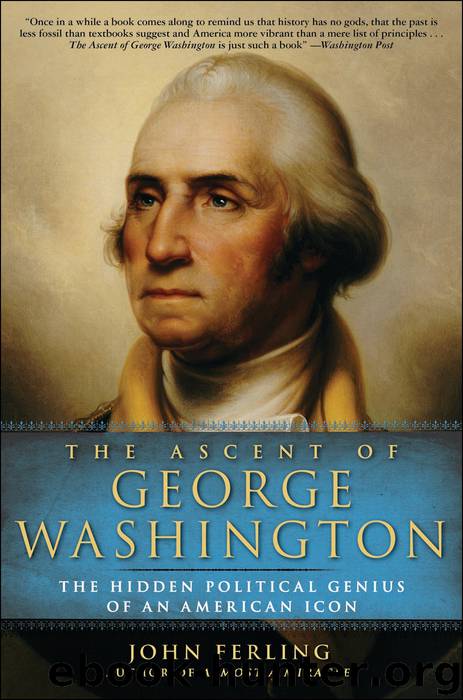The Ascent of George Washington by John Ferling

Author:John Ferling
Language: eng
Format: epub
Publisher: Bloomsbury Publishing Plc
See notes on Chapter 6
PART THREE
FIRST IN THE HEARTS OF HIS COUNTRYMEN
7
WASHINGTON AND THE POLITICS OF INTRIGUE: TO THE END OF THE WAR
Yorktown was the decisive engagement in the Revolutionary War, though considerable time passed before all knew with certainty that Cornwallis’s defeat led to peace. Yorktown brought down the government of Lord North, which had taken Great Britain to war and managed the war effort throughout. The new British government appeared to be committed to peace, though a wary Franklin advised Washington that “we cannot be safe while they keep Armies in our Country.”1 Washington concurred, especially as Britain and France continued to fight on the high seas. When the Royal Navy thrashed the French fleet in the Caribbean, taking de Grasse prisoner in the spring of 1782, Washington was nearly overcome with despair. For a time, he feared the drubbing might induce France and Spain to conclude a separate peace with Britain, leaving London free once again to train its full energies on America, as it had done in the desperate days of 1776–1777.2 Washington’s uneasiness only increased when, near the first anniversary of Yorktown, a Franco-Spanish attempt to take Gibraltar failed disastrously.
Convinced that the “haughty Pride” of Great Britain would keep it at war with America, Washington, in the months following Yorktown, preached the necessity of maintaining a war footing, and he urged the states to fill their manpower quotas so that the United States would be able “to meet their [London’s] hostile intentions.” He kept the army in a defensive stance, arguing prudently that it was unwise to try anything risky. However, when he met with Rochambeau in July, their first get-together since Yorktown, Washington—no longer worried about a French takeover of Quebec, if indeed he had ever been troubled by such a prospect—urged a joint invasion of Canada. It was the second time that Washington had proposed an allied incursion into Canada, the very step he had denounced in 1779 at a far more grave time during the war. His sudden interest in driving the British from Canada in 1782 had little to do with the military situation. It grew from an amalgam of national security and pecuniary considerations. Depicting the “annexation” of several Canadian provinces as “matters of great moment,” Washington left little doubt that he saw the acquisition of this vast region as important for those who wished to speculate in, or settle on, the frontier lands of New England, New York, and the trans-Appalachian West. Taking Canada would pacify the Indians who were dependent on Great Britain for modern armaments, he said. It would forestall “British . . . intrieguing after Peace,” giving Americans access to the fur trade and to the alluring lands in trans-Appalachia and those that splayed to the west of Quebec. But as there was nothing in it for France, Rochambeau demurred. Washington never considered a unilateral American invasion of Canada.3
By the time Washington suggested a joint invasion, peace talks had been under way in Paris for nearly three months.
Download
This site does not store any files on its server. We only index and link to content provided by other sites. Please contact the content providers to delete copyright contents if any and email us, we'll remove relevant links or contents immediately.
| American Revolution | Civil War |
| US Presidents |
Fanny Burney by Claire Harman(25808)
Empire of the Sikhs by Patwant Singh(22203)
Out of India by Michael Foss(16326)
Leonardo da Vinci by Walter Isaacson(11944)
Small Great Things by Jodi Picoult(6121)
The Six Wives Of Henry VIII (WOMEN IN HISTORY) by Fraser Antonia(4810)
The Wind in My Hair by Masih Alinejad(4437)
The Lonely City by Olivia Laing(4139)
The Crown by Robert Lacey(4125)
A Higher Loyalty: Truth, Lies, and Leadership by James Comey(4051)
The Iron Duke by The Iron Duke(3663)
Millionaire: The Philanderer, Gambler, and Duelist Who Invented Modern Finance by Janet Gleeson(3591)
Sticky Fingers by Joe Hagan(3465)
Alive: The Story of the Andes Survivors by Piers Paul Read(3329)
Papillon (English) by Henri Charrière(3292)
Joan of Arc by Mary Gordon(3281)
Stalin by Stephen Kotkin(3103)
Aleister Crowley: The Biography by Tobias Churton(3039)
Ants Among Elephants by Sujatha Gidla(2937)
